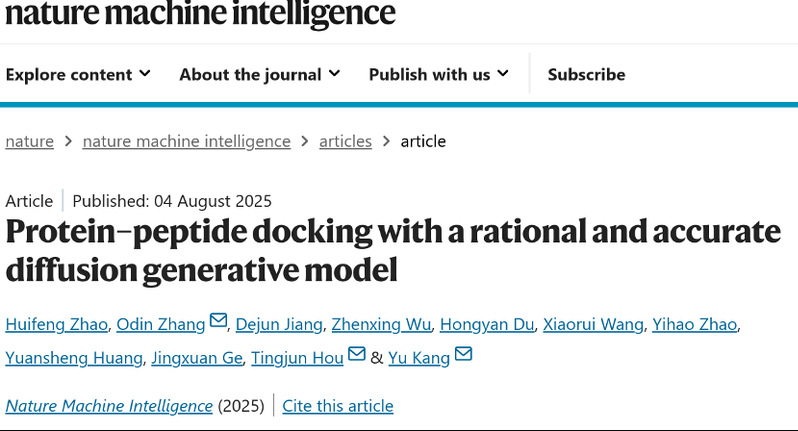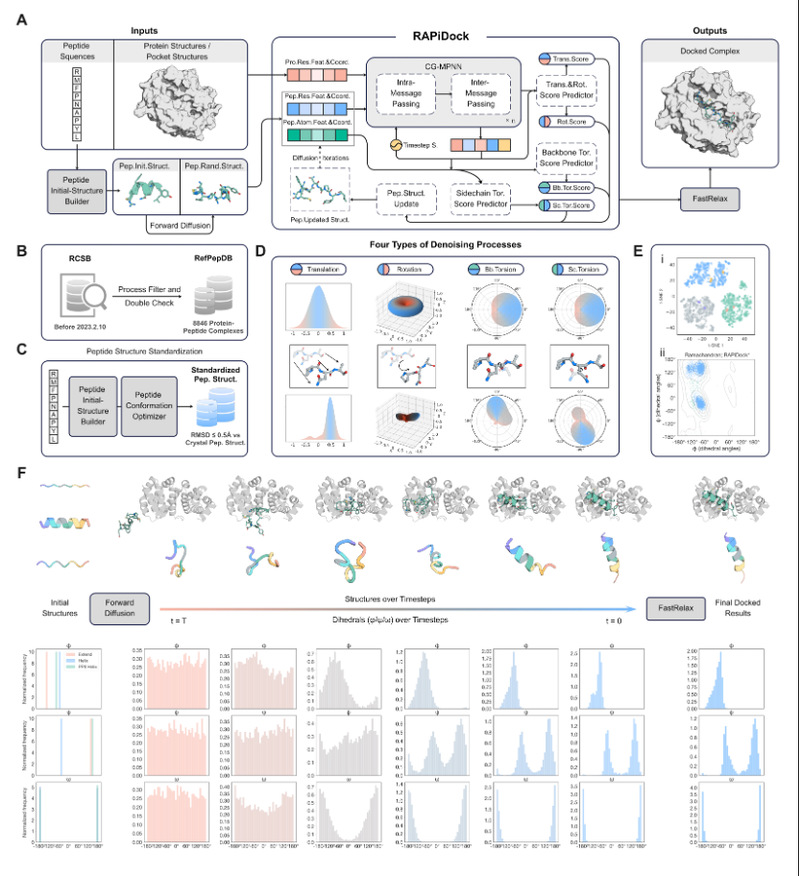The team from School of Pharmacy, Zhejiang University Publishes in Nature Machine Intelligence: Rapid, Accurate, and Rational Protein-Peptide Docking Based on Diffusion Generative Models
2025-08-08 | 药学院英文网
In recent years, the importance of peptide drug design has become increasingly prominent. However, due to the flexible conformations and diverse binding modes of peptide molecules, both traditional docking methods and deep learning tools struggle to achieve efficient and accurate modelling. To overcome this bottleneck, the team from School of Pharmacy, Zhejiang University proposed RAPiDock, an atom-level protein-peptide docking method based on diffusion generative models. It offers high accuracy, rapid speed, multi-conformation capabilities, and modifiable features, providing a novel solution for structural prediction and virtual screening in complex protein-peptide systems.

On 4 August 2025, the research team led by Yu Kang and Tingjun Hou from the School of Pharmacy at Zhejiang University published a paper entitled "Protein–peptide docking with a rational and accurate diffusion generative model" in Nature Machine Intelligence. This model effectively enhances the physical plausibility and sampling efficiency of docking structures by introducing a non-traditional Euclidean space diffusion process and compressing the peptide conformational space through physical constraints. Concurrently, RAPiDock innovatively employs a bi-scale graph structure at both atomic and residue levels, enabling multidimensional modelling of peptide molecules. This approach further enhances the model's capacity to capture geometric and physical principles governing the binding process.

Figure 1.RAPiDock Model Architecture Diagram
Experimental results demonstrate that RAPiDock achieved a Top-25 prediction success rate of 93.7% on the RefPepDB-RecentSet test dataset, representing a 13.4% improvement over AlphaFold2-Multimer. Furthermore, its prediction speed increased by approximately 270-fold (taking only about 0.35 seconds per complex). RAPiDock supports full-atom modelling of 92 amino acid residues, including multiple post-translational modifications, and possesses capabilities to recognise multi-site binding conformations, restore key site interactions, and capture subtle conformational changes, significantly enhancing modelling performance for complex protein-peptide systems. RAPiDock rapidly and accurately generates high-quality binding conformations, providing crucial technical support for enhancing the efficiency of high-throughput virtual screening and peptide drug design for peptide molecules.
The School of Pharmacy at Zhejiang University is the primary affiliation for this thesis. Huifeng Zhao, a doctoral candidate at Zhejiang University, is the first author. Associate Professor Yu Kang and Professor Tingjun Hou of Zhejiang University, alongside Haotian Zhang, a 2024 Master's graduate from the School of Pharmacy at Zhejiang University and doctoral candidate at the University of Washington, serve as joint corresponding authors.
Original link: https://www.nature.com/articles/s42256-025-01077-9
NEWS
-
10
2025.12
-
27
2025.11
-
25
2025.11
-
03
2025.11
-
30
2025.10
-
29
2025.10
